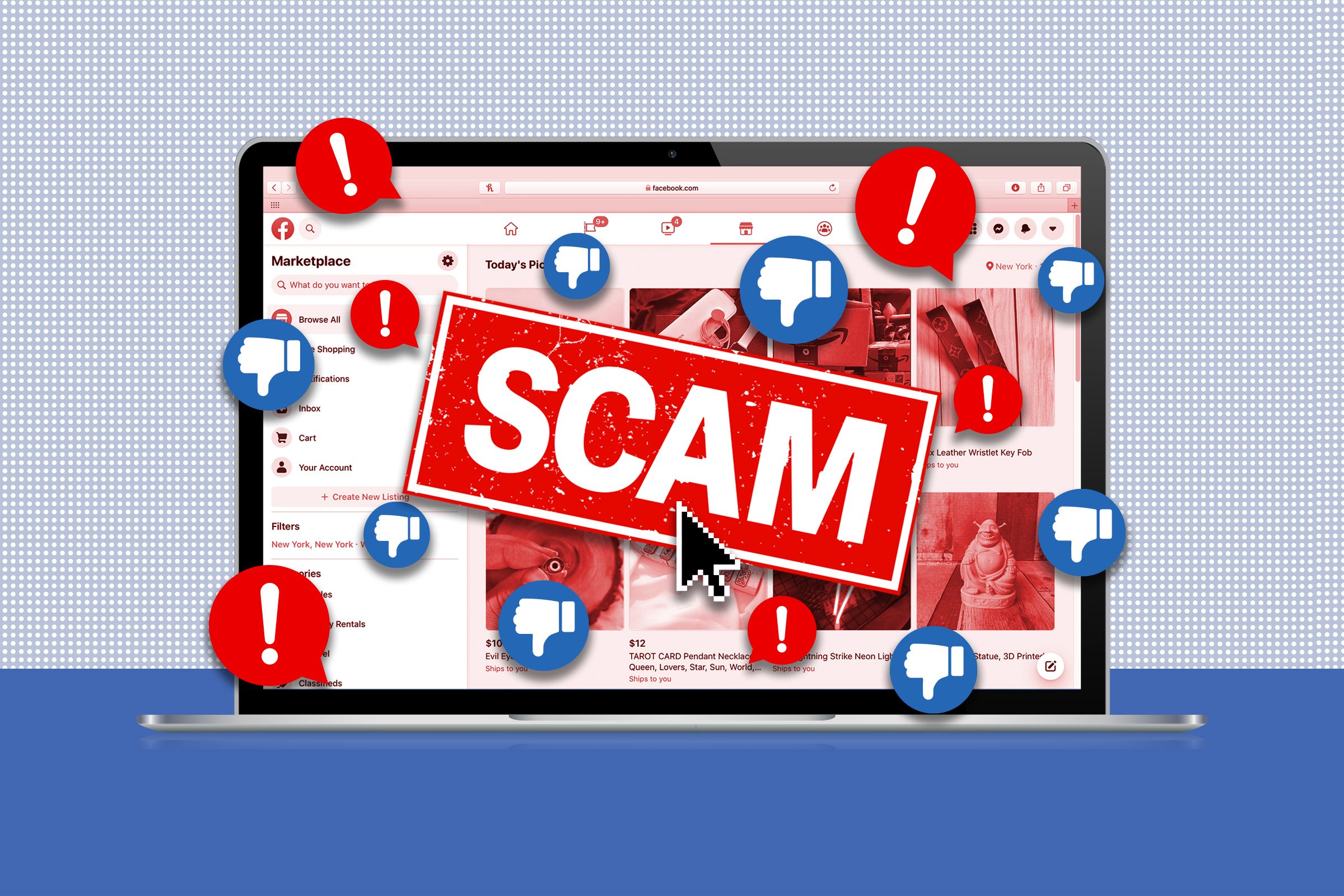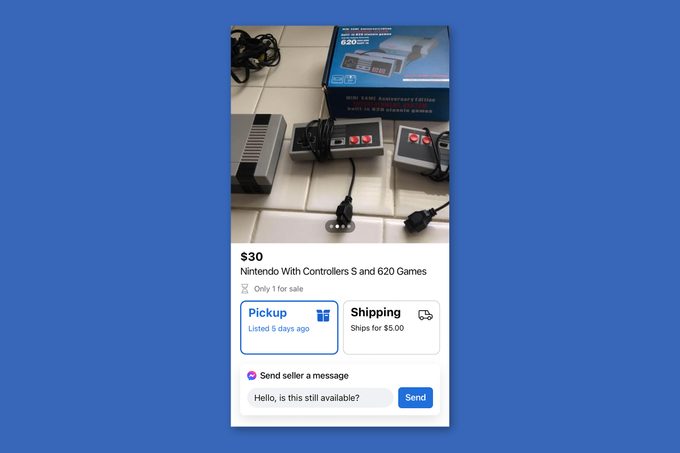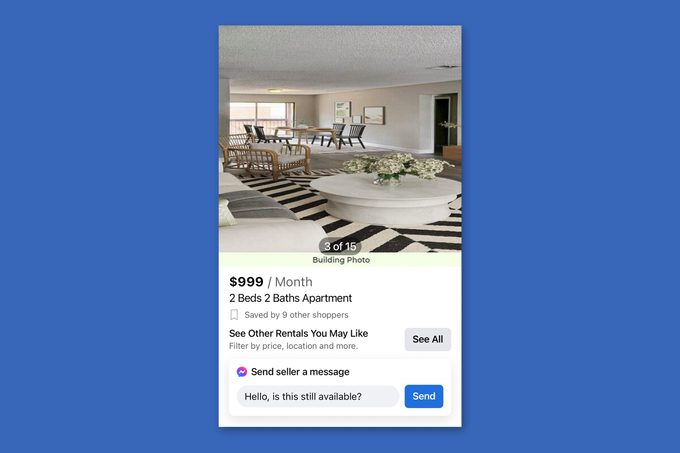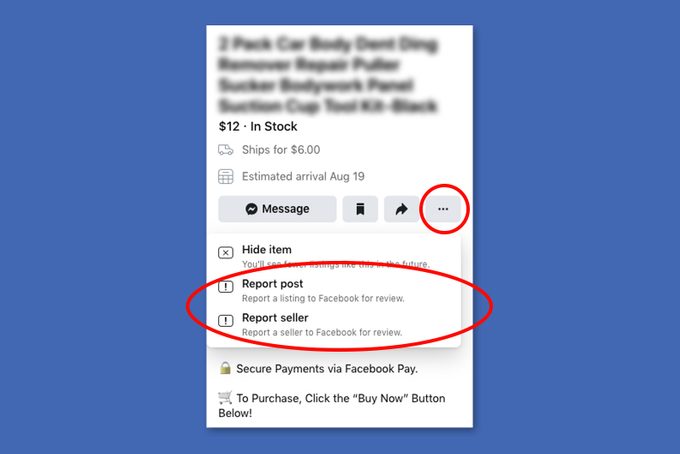Buyer beware: Scammers have set up shop on Facebook. Here's how to avoid falling victim to some common Facebook Marketplace scams.

15 Facebook Marketplace Scams to Watch Out For

More than a billion users buy and sell goods on Facebook Marketplace each month—but they aren’t the only ones cashing in. Facebook Marketplace scams are on the rise, with one report finding that buyer and seller scams increased by 78 percent toward the end of 2023.
Since 2021, Americans have lost upwards of $2.7 billion to scammers on social media, the “golden goose” for fraudsters, according to the latest Federal Trade Commission report. A survey of 1,000 Americans found that Facebook was the top platform for these scams, with 6 in 10 respondents saying they’d encountered a scammer there. Over a third of Facebook Marketplace ads could be from scammers, per a 2023 report by TSB bank.
Why is Facebook Marketplace so popular for scammers? “Unlike eBay or Amazon, Facebook Marketplace shoppers have a lot more direct interaction and conversation with sellers,” says Paul Bischoff, a privacy advocate at Comparitech, a cybersecurity company. “That creates opportunities for scammers to trick victims into a number of scams with less oversight.”
These scams may look convincing, but they share certain red flags that make them easier to spot. Below, experts discuss the most common Facebook Marketplace scams and how to avoid them, so you can protect your money from criminals while you shop.
Get Reader’s Digest’s Read Up newsletter for more tech, cleaning, travel, and fun facts all week long.
Common Facebook Marketplace scams
Paying or communicating outside of Facebook
How this scam works: Once you express interest in an item posted for sale, the seller might ask you to communicate with or pay them through a different platform. “Scammers often want to get your money in a way that is irretrievable,” like through a wire transfer or Venmo payment, Bischoff says. “In addition to outside payment methods, they might convince victims to call or chat outside of Facebook, where their correspondence can’t be monitored.”
How to identify it: Beware of buyers and sellers who insist on communicating or receiving payments outside of Facebook’s official channels. Facebook’s Purchase Protection policies only cover payments made through Facebook Checkout, so there is no guarantee you will get your money back if you pay with another method. If you do choose to pay with another app, watch out for these Venmo scams and CashApp scams.
Mailing items
How this scam works: In this scam, fraudsters ask you to pay them first and then never send the item. By agreeing to pay for an item up front, “buyers run the risk of not receiving the items they pay for, either via non-delivery or by being delivered anything but what they pay for,” says Chris Hauk, a consumer privacy expert at Pixel Privacy. The scammer may share fake shipping information or screenshots to make it appear as though the item was sent, but in reality, they have already taken off with your money.
How to identify it: While it’s best to only purchase items that you can inspect and pick up in person, receiving products by mail is sometimes unavoidable. In those cases, sellers who can’t provide photos and video of the item before you purchase or ask you to pay for the item outside of Facebook’s official channels could be up to no good, and you’re better off taking your money elsewhere. Facebook Marketplace scams are sneakier than you might think—this true story of someone who got scammed on Facebook is just one example.
Selling counterfeit items

How this scam works: Don’t be fooled by a great deal on a designer purse or a rare gaming console. Facebook Marketplace is a hotbed for counterfeit or pirated items with price tags suspiciously below market rate. “If a seller is asking well below the usual asking price for an item, they’re likely up to something,” Hauk says.
How to identify it: Hauk recommends looking up the typical price of an item beforehand and comparing it to the listed price on Facebook Marketplace. “Always keep in mind the old adage: If something seems too good to be true, it probably is,” he says. You should also request multiple photos and even a video of the item before purchasing and do a reverse image search to see if a picture is fake.
Overpaying the seller
How this scam works: Believe it or not, sellers can get scammed by fraudsters too. In one common scheme, the overpayment scam, a buyer will pay you more than the requested amount for the item—say, $350 for a $300 couch—then claim to have made a mistake and request a partial refund for $50, explains Charlie Moore, chief consumer digital safety advisor at Aura. After you send them the refund, the original payment is declined and never ends up in your account, while the criminal pockets what you sent them.
How to identify it: Avoiding an overpayment scam is simple: “Don’t accept a check or any kind of digital payment that’s more than the agreed upon selling price, as it’s likely a scam,” says Moore. Going forward, make sure you know how to spot these other common online scams too.
Requesting advance payments
How this scam works: A fraudster may tell you that an item is popular and ask you to place a deposit or advance payment to secure your spot. Odds are, you will never receive the item, and the scammer will disappear with your money. Known as a “reservation” or “pay-in-advance” scheme, “this is one of the easiest ways to get scammed. “There’s often a sense of urgency—you must pay this now—and that’s a telltale sign that something is suspicious,” says Scott Schober, CEO of cybersecurity firm Berkeley Varitronics Systems and author of Hacked Again.
How to identify it: Too much pressure to put down a payment without having seen what you want to buy in person is a telltale sign of this scam, among others. “If you’re going to make a large purchase, have you physically seen what you want to buy or is this transaction 100% done over the internet? I instantly back up and question anything like that,” says Schober. “Take time to read reviews and do your own due diligence by Googling the seller.” FYI, fraudsters also use high-pressure tactics in romance scams on dating websites and social media, so watch out for those red flags.
Creating fake accounts
How this scam works: Before purchasing something on Facebook Marketplace, take a close look at the seller’s profile. Some scammers set up fake Facebook accounts to trick people into buying fake or nonexistent items and then disappear with the money.
How to identify it: One of the key things to look for is the date the Facebook account was created. Brand-new accounts should be a red flag, according to Burton Kelso, a tech expert at Integral, an onsite computer service. “In this day and age, most people will have a Facebook that was created at least 10 years ago,” he says. “If you see a Facebook account that was created within the past couple of months, buyer beware.”
Listing phony rentals

How this scam works: Heads up, house hunters—not all apartment and home rental listings on Facebook Marketplace are legitimate. “We have found that this is a niche that is rife with scammers,” says Sebastian Illing, co-founder of Alpaca Technology, which filters through thousands of listings on Facebook. “There are various apartment rental scams we’ve encountered, such as listings using fake or misleading pictures, bait-and-switch rental prices, charging illegal fees for background checks and even posting rentals owned by other people.”
How to identify it: There are many tricks that fraudsters use to sell phony rentals to victims, such as requiring an immediate payment, not showing the apartment or using fake or misleading photos. As a general rule of thumb, you should always tour the property in person and confirm its availability before filling out an application or transferring money. Anyone who claims that they can’t show you the property because they are out of town—or urge you to put a deposit down immediately—should set off alarm bells, Illing says.
Selling items that don’t work
How this scam works: One of the most popular Facebook Marketplace scams involves selling an item that doesn’t work, according to Kelso. “This can happen especially when purchasing computers or other tech devices,” he says. The seller knows that the item is broken but hopes that you won’t check it before handing over the money.
How to identify it: When you purchase items like electronics, Kelso recommends turning on and testing the devices to make sure they work properly before paying. And “don’t allow yourself to be pressured to make a deal,” Hauk says. “If the seller—or buyer, for that matter—pushes you to make a fast decision, walk away from the deal. If it smells fishy, it probably is.” Beware of these sneaky “deals” that are actually money scams too.
Advertising fake giveaways
How this scam works: Bad actors post links to fake cryptocurrency giveaways on their profiles, hoping that unsuspecting users will click on them, says Patrick Moore, co-founder of the cryptocurrency site CryptoWhat. “Scammers are able to use [Facebook] as a space for their own advertising purposes because anyone can list something on the page without any verification process in place,” he explains. By clicking on the link, victims might download malware onto their computers, allowing hackers to access sensitive information like passwords to email and bank accounts. Here are a few tips for identifying fake ads on social media.
How to identify it: Like many other Facebook Marketplace scams, giveaways that seem too good to be true probably are. To prevent your data from falling into the wrong hands, ignore suspicious-looking links, report phony accounts to Facebook and be on the lookout for these red flags that your computer has been hacked.
Requiring car deposits
How this scam works: Demand for vehicles on Facebook Marketplace is booming, but buyers should think twice before placing a deposit. Scammers often ask buyers to transfer a small fee to hold a car, then give them a fake address when it’s time to meet up, according to Piyush Yadav, owner of the price-comparison website Ask Any Difference.
How to identify it: Instead of trusting an online seller’s promises, do your research ahead of time by checking Kelley Blue Book or other trusted sites to learn what you should expect to pay. Facebook’s Help Center also recommends not sending payment before viewing the car in person and confirming ownership with a pink slip (a.k.a. the car title).
Inconsistent pricing
How this scam works: If a seller changes the price of an item after you message them, walk away. “Inconsistent pricing scams could be a simple bait-and-switch—a low price looks really exciting, and it’s too good to be true,” says Schober, “or it could be a way to lure you in and get more information about you.”
How to identify it: Inconsistent pricing is its own giveaway. When a seller switches up details on you or starts asking for personal information they don’t need to make a sale, cut them off, says Schober. Also important: Decline requests from the seller to make additional payments for shipping or other previously unlisted charges.
Google Voice scams
How this scam works: A scammer contacts a seller on Facebook Marketplace, expresses interest in their product and asks the seller to provide a phone number to prove that they are a real person. Using that phone number, the scammer opens a Google Voice account, sends the seller the verification code from Google and asks them for the code to verify that they are legitimate. Once the seller gives them the code, the scammer now owns a new Google Voice number that they can use for other nefarious purposes like phone call scams and doxxing attacks.
Buyers can also be victims of Google voice scams. “In a recent twist, we are hearing that scammers are now posing as sellers on Facebook Marketplace and asking potential buyers to verify they are legitimate by providing a Google Voice verification code,” says Mona Terry, chief operating officer and head of victim services at the Identity Theft Resource Center.
How to identify it: If someone contacts you on Facebook Marketplace and asks for personal information like your phone number, you should view them with suspicion, says Daniel Clemens, founder and CEO of ShadowDragon, a cybersecurity solutions developer. A request to send a verification code from Google Voice should be an even bigger warning sign to cut off contact with someone.
Insurance-fee scams
How this scam works: For items being sent by mail, fraudsters will request that buyers pay for shipping insurance on top of the item and shipping costs. Sometimes, the scammer will even send a fake invoice as proof, Terry says. But once the money is paid, the scammer disappears.
How to identify it: Legitimate sellers on Facebook Marketplace will not request any additional payment beyond the cost of the item and possible shipping fees. If someone asks you to send money for unexpected charges, cancel the transaction immediately.
Facebook Marketplace Zelle scams
How this scam works: Like the car deposit and advance-payment scams, Zelle scams use the popular digital payment service to steal your money. Scammers target sellers of big-ticket items by paying through Zelle and either sending more money than the item’s price or sending a spoofing email that looks like it’s from Zelle. One version of this scam is to ask for you to “upgrade” to a Zelle business account to accept a transaction, an official-sounding but fake procedure. On the flip side, a phony seller might ask a buyer to pay them for an item using Zelle, then take off with the money without sending the product.
How to identify it: Think twice before agreeing to pay or accept payment from users on Facebook Marketplace through Zelle. “Scammers are aware that Zelle offers instant funds transfer, and the charges authorized by a user are not protected should a transaction go south,” says Chris Furtick, CISSP, a certified information systems security professional and deputy chief information security officer at Coveware, a company that helps organizations recover after cyberattacks. Stick to more secure payment systems like PayPal or Facebook Checkout instead.
Facebook Marketplace direct messaging scam
How this scam works: Since late 2024, Facebook Marketplace users have begun to report suspicious messages from entities posing as chatbots like “Facebook Marketplace Assistant, “Facebook Marketplace Security Notification,” or “Marketplaces AI.” Hackers and criminals use “trust anchors” you tend to automatically trust as real—like automated messages—to trick you into believing they’re legit, explains Warmenhoven. The supposedly official account sends a direct message claiming that the user has violated guidelines or community standards and urges them to take action by clicking a link.
How to identify it: Besides typos and strange-looking links, the giveaway for a Facebook scam like this is the method of communication: Facebook Marketplace is not going to drop into your DMs to send you a security notification. “For any entity you’re interacting with—like Facebook Marketplace or your bank—it’s important to not respond to the message but rather re-contact them via methods on their website,” says Warmenhoven. In this case, that looks like going to “Help & Support” under your profile’s dropdown menu and checking your account status and support inbox for similar alerts. If you see nothing, you can rest assured that the message was a false alarm and report the scam account.
How to avoid getting scammed on Facebook Marketplace
-
Trust your gut. If something seems off about a buyer or seller, walk away. “There’s never a once-in-a-lifetime deal on Facebook Marketplace or anywhere like that,” says Warmenhoven. The world is full of stuff—and it’s better to pass up an iffy listing than to fall for a scam.
-
Slow down. If you feel like you’re speeding toward making a deal, that’s exactly when you need to hit the breaks. “It’s an old hacker’s trick so you don’t have time to think about what is reasonable or not,” explains Warmenhoven. “If you notice that somebody is pushy, whether it’s a buyer or seller, don’t do it.”
-
Do a little research. With any transaction, always take the time to verify who you’re talking to. Hauk recommends checking a seller’s profile for negative reviews and avoiding newly created accounts with no reviews at all.
-
Pay for items through Facebook. Using the official payment and shipping methods will protect your money if something goes wrong.
-
Get a tracking number. If you’re receiving an item by mail, Hauk suggests requesting a shipping tracking number. Of course, also make sure to use Facebook Checkout to protect your purchase.
-
Meet the seller in person, if possible. Use Facebook Marketplace’s filters to narrow your search to the items available for local pickup, and meet the seller in person so you can examine the product before paying.
-
Don’t pay for an item before receiving it. Instead, exchange the money and the item at the same time. For safety reasons, make sure this is in a well-lit, visible and public location.
-
Don’t go to a meetup alone. When meeting a seller in person, Facebook suggests bringing another person with you or sharing your meeting plan with a friend or family member as an added precaution.
-
Decline overpayments. Also request that all payments go through Facebook-approved channels. (Again, Facebook Checkout is your best bet here.)
-
Don’t share sensitive information. In most instances, you should never give out your bank account, credit card, social security number, date of birth or phone number. “If someone is asking for these things in a progression, be on guard,” Clemens says.
What does Facebook do to prevent scams?
To prevent scams on Facebook Marketplace, Facebook has created several protections for both buyers and sellers. For starters, buyers can leave reviews for sellers using a five-star system based on their experience during the transaction. The seller’s commerce profile will show their rating from other buyers, as well as badges like “Super Seller,” “Very Responsive,” “Reliable Shipper,” and more.
Some purchases on Marketplace are covered by Facebook’s Purchase Protection policy too. If a buyer didn’t receive their order or the order was damaged, they could be eligible to receive a refund. However, keep in mind that “the Purchase Protection plan is very specific on what is covered and how the item should be paid for,” according to Furtick. To qualify for the Purchase Protection policy, you must use Facebook Checkout for your transaction.
Finally, Facebook offers an online guide for buying and selling on Facebook Marketplace safely and responsibly. It covers many of the best practices that buyers and sellers should consider to protect themselves online, including meeting in person, watching out for counterfeit products and using secure payment methods.
What to do if you think you’ve been scammed

Facebook Marketplace is constantly searching for scams and removing listings that violate their policies, but they don’t catch everything. If you believe you’ve been scammed, experts say you should immediately report the incident to Facebook and block the scammer.
To report a seller on Facebook Marketplace, click the Marketplace icon in the left-hand corner of your computer screen, click the listing from the seller you want to report and then click on the name of the seller. From there, click the three-dot icon and select Report Seller; then follow the on-screen instructions.
If you’ve lost money, you can also alert the Federal Trade Commission and Internet Crime Complaint Center. And if your Facebook account was hacked, here’s how to recover your account and beef up your password security to stay safe in the future.
About the experts
|
Why trust us
Reader’s Digest has published hundreds of articles on personal technology, arming readers with the knowledge to protect themselves against cybersecurity threats and internet scams as well as revealing the best tips, tricks and shortcuts for computers, cellphones, apps, texting, social media and more. For this piece on tech tips, Brooke Nelson Alexander tapped her experience as longtime journalists and tech reporter. We rely on credentialed experts with personal experience and know-how as well as primary sources including tech companies, professional organizations and academic institutions. We verify all facts and data and revisit them over time to ensure they remain accurate and up to date. Read more about our team, our contributors and our editorial policies.
Sources:
- ABC News: “Facebook Marketplace has become the home of scammers. The problem may be getting worse”
- Federal Trade Commission: Social media: a golden goose for scammers
- F-secure: “F-Secure study identifies an ongoing consumer scam surge”
- TSB Bank: “Urgent consumer warning as TSB finds over a third of adverts on Facebook Marketplace could be scams”
- Paul Bischoff, privacy advocate at Comparitech
- Facebook: “Purchase Protection Policies”
- Chris Hauk, consumer privacy expert at Pixel Privacy
- Matthew Paxton, founder of Hypernia
- Burton Kelso, tech expert at Integral
- Sebastian Illing, co-founder of Alpaca Technology
- Patrick Moore, co-founder and creator of CryptoWhat
- Piyush Yadav, owner of Ask Any Difference
- Mona Terry, chief victims officer at the Identity Theft Resource Center
- Facebook: “How do I report a seller on Facebook Marketplace?”
- Daniel Clemens, founder and CEO of Shadow Dragon
- Chris Furtick, director of security engineering and incident response at Fortalice Solutions























